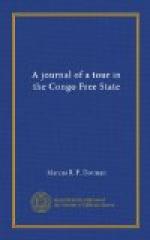It is indeed a great relief to think that instead of struggling up rapids, when next we take to canoes we shall be whirled rapidly down stream. There is, however, nothing like a mountain or even a considerable hill in this part of Uele. After an hour or two the forest ends and we cross a plain covered with grass only four to six feet high on which clumps of trees and bushes are dotted about. On every side are traces of elephant, antelope and wild cattle but the sun is now high on his brilliant course and only man is foolish enough to work in the day time in Central Africa. It is indeed very hot marching for there is no shade and it is necessary to change the gun for the umbrella. In another hour we reach the string of villages constituting the territory of the Sultan of Enguetra who like the Sultan of Djabir is not a particularly good chief. His people, however, receive the porters kindly and give them bananas. Then on again under a very fierce sun until the north bank of the Likati river is reached. Here we enter a canoe and are rapidly paddled down the stream which is only about twenty yards wide, until we reach a clearing in the forest in which the Post of Enguetra is being built by Lieutenant Gaspard. In a few weeks he has constructed a fine brick house of two storeys with a large verandah looking down a natural avenue to the river.
At this time of the year—the early days of November—the Post is practically an island for the river flows on one side and on the other three water is standing in the forest to the depth of three or four feet. This is no doubt good for the rubber vines but bad for hunting. However, I determine to settle here for a week or two and hunt the forest and plains about. Next morning herefore I start at 5 a.m. in the dark and follow the guide who evidently feels the cold and steps out at a good pace. After passing through the plantation we strike into dense forest and the walking becomes very difficult. Roots of trees below, branches and vines above have to be dodged all the time and it is a relief to march along the bed of a stream even if it has two or three feet of water in it. It is impossible to see for more than a yard or two on each side through the dense undergrowth and the sun and sky are quite invisible although patches of lights show that the former is now well above the level of the tallest tree. Traces of elephant and antelope abound, the former being of small size without points worth having. After two hours we reach the plain and find the water nearly six feet deep. There is no place about to pitch a tent and it is extremely difficult marching in the forest in the night, but the only chance of an elephant is to be here an hour or two before daybreak. Indeed it is almost impossible to hunt until the water subsides and that means waiting for over a month. However there are plenty of small beasts and birds so the day was not altogether wasted.




